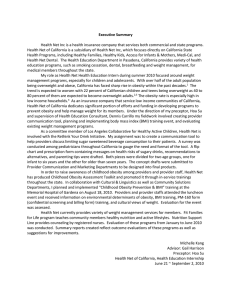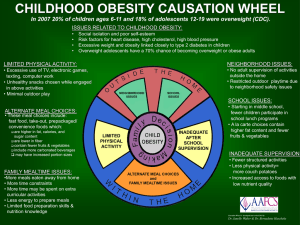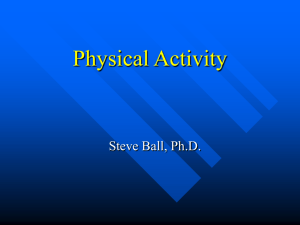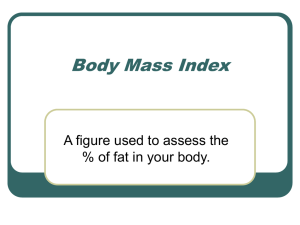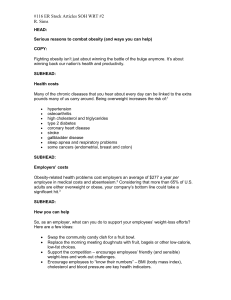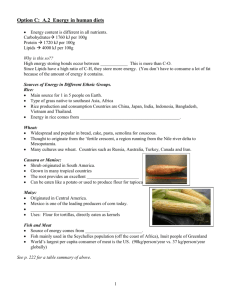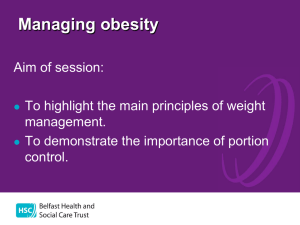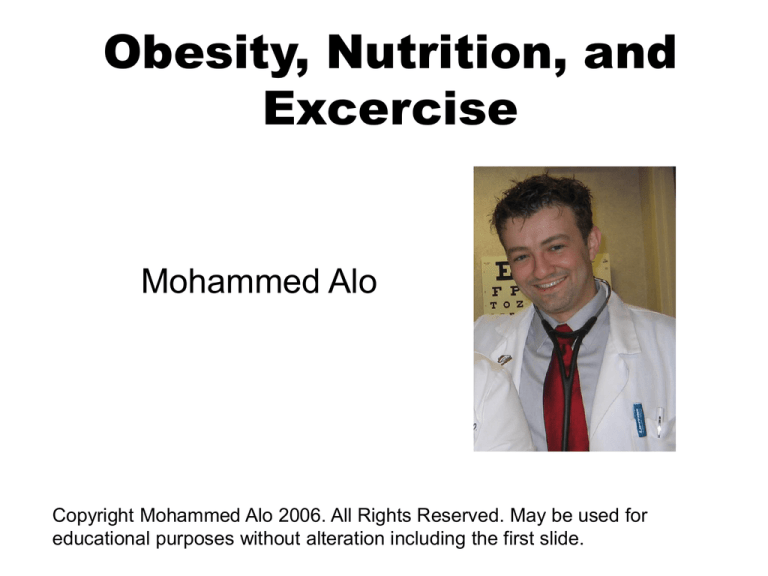
Obesity, Nutrition, and
Excercise
Mohammed Alo
Copyright Mohammed Alo 2006. All Rights Reserved. May be used for
educational purposes without alteration including the first slide.
Questions?
•
•
•
•
•
•
•
•
Is being overweight bad?
Is it a serious problem in America?
How many think they are overweight?
How many want to lose weight?
What have you tried?
Did you gain your weight back?
How many of you had overweight parents?
Is obesity genetic?
Questions?
• What percentage of United States
population is overweight?
• What percentage of population is obese?
• What percentage of children overweight?
Answers
• 67% of adults overweight
• 30% of adults obese
• 16% of children 6-19 years of age
overweight
Costs of obesity?
Q: What is the cost of overweight and obesity?
A: Total cost: $117 billion , Direct cost: $61 billion,* Indirect cost: $56 billion
(comparable to the economic costs of cigarette smoking)
Q: What is the cost of heart disease related to overweight and obesity?
A: Direct cost: $8.8 billion (17 percent of the total direct cost of heart disease,
independent of stroke)
Q: What is the cost of type 2 diabetes related to overweight and obesity?
A: Total cost: $98 billion (in 2001)[15]
Q: What is the cost of osteoarthritis related to overweight and obesity?
A: Total cost: $21.2 billion, Direct cost: $5.3 billion, Indirect cost: $15.9 billion
Q: What is the cost of hypertension (high blood pressure) related to overweight
and obesity?
A: Direct cost: $4.1 billion (17 percent of the total cost of hypertension)
Q: What is the cost of gallbladder disease related to overweight and obesity?
A: Total cost: $3.4 billion, Direct cost: $3.2 billion, Indirect cost: $187 million
More costs…
Q: What is the cost of cancer related to overweight and obesity?
•
•
•
Breast cancer: Total cost: $2.9 billion, Direct cost: $1.1 billion, Indirect cost: $1.8
billion
Endometrial cancer: Total cost: $933 million, Direct cost: $310 million, Indirect
cost: $623 million
Colon cancer: Total cost: $3.5 billion, Direct cost: $1.3 billion, Indirect cost: $2.2
billion
Q: What is the cost of lost productivity related to obesity?
•
•
•
•
•
The cost of lost productivity related to obesity (BMI > 30) among Americans
ages 17–64 is $3.9 billion. This value considers the following annual numbers
(for 1994):
Workdays lost related to obesity: 39.3 million
Physician office visits related to obesity: 62.7 million
Restricted activity days related to obesity: 239.0 million
Bed-days related to obesity: 89.5 million
Obesity?
Once all of the Lung Cancer generation
has died off, the number one killer will
be Obesity and it’s complications.
No 1 KILLER!
What is obesity?
We know it when we
see it
Morbid Obesity
Morbid Obesity?
Fat Kids
The opposite of obese
The wise guy
Why fat kids?
Weight is not genetic!
Definition?
Obesity = Body Mass Index over 30
BMI =
Weight in Pounds
x 703
(Height in inches) x (Height in inches)
Mohammed Alo
Wt: 175
Ht: 68 inches
(175/(68x68)) x 703
175/4624 x 703 =
26.6
More BMI Definitions
< 18.5
19 – 25
25 – 30
30 – 40
40 +
Underweight
Normal
Overweight
Obese
Extremely Obese
More on BMI
BMI is a good overall average. It does work for all,
but there are some modifications.
1. Women should try to be at lower end of normal
(18-23), men at higher end (23-25)
2. Athletes, body builders, etc will have
“overweight” BMI.
3. BMI is one factor among many. Try to improve
all factors.
BMI-Associated Disease Risk
BMI (kg/m2)
Risk
<18.5
Increased
Normal
18.5-24.9
Normal
Overweight
25.0-29.9
Increased
I
30.0-34.9
High
II
35.0-39.9
Very High
III
>40
Extremely high
Classification
Underweight
Obese
Additional risks:
• Large waist circumference (men>40 in; women >35 in)
• 5 kg or more weight gain since age 18-20 y
• Poor aerobic fitness
• Specific races and ethnic groups
Clinical Guidelines on the Identification, Evaluation, and Treatment of Overweight
and Obesity in Adults—The Evidence Report. Obes Res 1998;6(suppl 2).
Obesity Trends* Among U.S. Adults
BRFSS, 1991, 1996, 2004
(*BMI 30, or about 30 lbs overweight for 5’4” person)
1991
1996
2004
No Data
<10%
10%–14%
15%–19%
Source: Behavioral Risk Factor Surveillance System, CDC.
20%–24%
≥25%
Medical Complications of Obesity
Pulmonary disease
abnormal function
obstructive sleep apnea
hypoventilation syndrome
Nonalcoholic fatty liver
disease
Idiopathic intracranial
hypertension
Stroke
Cataracts
steatosis
steatohepatitis
cirrhosis
Coronary heart disease
Diabetes
Dyslipidemia
Hypertension
Gall bladder disease
Severe pancreatitis
Gynecologic abnormalities
Cancer
abnormal menses
infertility
polycystic ovarian syndrome
breast, uterus, cervix
colon, esophagus, pancreas
kidney, prostate
Osteoarthritis
Skin
Gout
Phlebitis
venous stasis
Complications no one talks about
•
•
•
•
•
•
Not fitting in CT scanner
Abdominal surgery and healing
Medical emergencies-can they carry you?
Difficulty dosing medications
Operating tables not capable
Not fitting in airplane
Relationship Between BMI and
Cardiovascular Disease Mortality
Relative Risk of Death
3.0
Men
2.6
Women
2.2
1.8
1.4
1.0
Lean
0.6
Overweight
Obese
<18.5 18.5 20.5 22.0 23.5 25.0 26.5 28.0 30.0 32.0 35.0 >40.0
–
–
–
–
–
–
–
–
–
–
20.4 21.9 23.4 24.9 26.4 27.9 29.9 31.9 34.9 39.9
Body Mass index
Calle et al. N Engl J Med 1999;341:1097.
Slide Source:
www.obesityonline.org
Obesity Is Caused by LongTerm Positive Energy Balance
Fat
Stores
Diet or Exercise?
What is more important in
determining your body
composition?
85% Diet
15% Exercise
Diet or Exercise Study
• JAMA March 22/29 2006
• 27,000 women since 1992
• BMI or Activity level?
High BMI was more strongly related to adverse
cardiovascular biomarker levels than physical
inactivity. However, within BMI categories,
physical activity was generally associated with
more favorable cardiovascular biomarker levels
than inactivity.
You are what you eat!
How many Calories do
I need?
Determine Calorie Needs
Estimated Energy Requirements* for males
3400
3200
3000
2800
ACTIVE
Calories
2600
2400
2200
2000
SEDENTARY
1800
1600
1400
1200
1000
3
4
5
6
7
8
9
10 11 12 13 14 15 16 17 18 20 25 30 35 40 45 50 55 60 65 70 75 80
Age
*From the National Academy of Sciences, Institute of Medicine Dietary Reference Intakes Macronutrient Report
Discrepancy Between Reported and
Actual Energy Intake and Expenditure
3000
Energy Intake
Energy Expenditure
*
2500
Kcal/d
2000
1500
*
1000
500
0
Reported Actual
*P<0.05 vs reported.
Lichtman et al. N Engl J Med 1992;327:1893.
Reported Actual
Calories to lose weight?
Total 1800 calories per day
500 less calories per day than what you
need (3500/week)
Results in stable weight loss of 1-2 pounds
per week.
Lifetime Food Intake
Water
Fat
Carbs
Protein
45,300 kg
2300 kg
8000 kg
1900 kg
21 kcal*
31 kcal*
7 kcal*
*kcal in millions
Short-term Obesity Therapy Does Not Result in
Long-term Weight Loss
Change in Weight (kg)
5
0
Diet alone
Behavior therapy
Combined therapy
-5
-10
-15
-20
Baseline
End of
Treatment
Wadden et al. Int J Obes 1989;13 (Suppl 2):39.
1-year
Follow-up
5-year
Follow-up
Weight Loss (%)
Long-term Weight Loss is Improved
with Long-term Maintenance
Therapy
0
-2
-4
-6
-8
-10
-12
-14
-16
-18
No maintenance tx
Maintenance tx
Diet and
behavior
modification
therapy
0 1 2
3 4
P <0.05
5 6 7
8 9 10 11 12 13 14 15 16 17
Time (mo)
Perri et al. J Consult Clin Psychol 1988;56:529.
Diet everyday for the rest of
your life
• A diet is a long term commitment.
• Just like you have to sleep every night,
you have to diet every day.
• Any time you eat, you are dieting.
• You have to diet everyday for the rest of
your life!
• 95% of people gain all their weight back, is
not true!
Total Garbage!
95% of people that lose weight will gain it
back!
Why?
•
•
•
•
Body is very smart
Human Body has set point for weight
Takes 8-12 months to reset
Inmate experiments with
over/underfeeding
• Body detects less food as starvation and
lowers metabolism
• Eating once a day and skipping meals
reinforces starvation signal.
Hyperphagia
Pattern of Changes In Energy
Intake, Body Fat, and Fatfree Weight
100% +
78% of Control
100%
Control
Value
100%
Control
Value
Fat-free Wt
Feeding 40%
of Control
Fat Wt
Restricted Ad libtium
C12
S12
Semistarvation
S24
R12
R20
Refeeding
Keys, 1950; Dulloo, AJCN - 1997
Obesity Treatment Pyramid
Surgery
Pharmacotherapy
Lifestyle Modification
Diet
Physical Activity
History of USDA’s Food Guidance
Food for
Young
Children
1992
1916
1940s
1970s
2005
1950s-1960s
--1992-Food Guide Pyramid
Reasons for Revising—
Updating the Science
• To ensure that the guidance reflects the latest
nutrition science
– New nutrient standards—DRI
– New Dietary Guidelines
– Food consumption and composition data
– Americans still gaining weight with old
pyramid
--2005-MyPyramid
Print materials: Mini Poster
Key food group messages from the
Dietary Guidelines and MyPyramid:
Focus on fruits.
Vary your veggies.
Get your calcium-rich foods.
Make half your grains whole.
Go lean with protein.
Know the limits on fats, salt, and sugars.
Daily Amounts
in cups or ounces
Print materials: Mini Poster
Implementation
• Implementation is the
challenge ahead.
• Health/education
professionals are vital for
success.
• It will be an ongoing
process.
• Working together, we can
help Americans to be
healthier.
What types of calories?
• Carbohydrates- sugar, bread, rice, pasta
• Protein- meat, beans
• Fat- butter, oil, margarine, fat on meat
Also…
• Fiber- fruits, veggies, bran
Carbohydrates?
• Sugars, flour, oat, grain, bread, rice, pasta
Protein?
• Meat and beans
Fats?
• Oil, butter, parts of meat, skin
Saturated Fat
• Fat that is Solid at room temperature
-Butter, cheese, margarine, ice cream, meat fat,
skin, peanut oil, palm oil
Fiber?
• Fruits, veggies, whole everything
Indigestible, fills you up, lowers cholesterol
What diets?
•
•
•
•
•
•
•
All diets work
You have to do them and be dedicated
Human Body has set point for weight
Takes 8-12 months to reset
Inmate experiments with over/underfeeding
Women can’t lose weight as easily
Skipping meals send wrong signal (starvation,
body lowers metabolism)
• Eat smaller spread out meals
All Diets
1
Low Calorie/Low
Fat
2
High Protein/Low
Carb
Low Calorie/Low Fat Diets
•
•
•
•
•
Eat less of everything
Eat less fat
Monitor caloric intake closely
Count calories
Many choices: Zone Diet, Jenny Craig, Weight
Watchers
• Many physicians endorse these, Dr. Koop, Dr.
Sears (Zone)
Low Calorie/Low Fat Diet
Advantages:
• Easy to tolerate
• Lots of low fat
foods
• Can still be doing
this in 2010
• Weight Watchers is
best choice
• Slow weight loss
Disadvantages:
• Becomes boring,
people lose interest
• Has lead to more
weight gain
• Very tight caloric
control
• Slow weight loss
High Protein/Low Carb Diet
Eat protein and fat: eggs, chicken, beef, bacon,
cheese
Avoid: bread, rice, sugar, pasta, potatoes
Eat as much as you want
No need to count calories
Separated into 3 or 4 stages
Fast initial results
Avoid fruits and veggies in initial stage
Many to chose from: Atkins Diet, South Beach Diet
Endorsed by many physicians and cardiologists:
Dr. Agatston (invented heart scan)
High Protein/Low Carb Diet
Advantages:
• Easy to follow
• Quick weight loss
initially
• No calorie counting
• Reduces many
cardiovascular risk
factors (diabetes,
weight, LDL, HDL,
CRP, etc)
• Atkins and South
Beach both work great
Disadvantages:
• If you don’t like
meat you are in
trouble (use protein
shakes)
• May be costly
• Maybe difficult to
still be doing this in
2010
Other Tips
•
•
•
•
•
Drink plenty of water
Eat slowly
Eat half your plate
Sugar alternatives
Low fat usually = More Sugar (better to
find lower calorie)
• Stop telling kids to eat whole plate
• Substitute good for bad
Substitution?
•
•
•
•
•
•
Splenda instead of Sugar
Oil instead of butter, margarine, lard, fat
Ground turkey instead of beef (or low fat beef)
Chicken or fish instead of beef
Whole grain instead of plain
Low carb pasta instead of pasta (even whole
grain pasta is available)
• Fruit instead of cake, desert
• Lettuce wrap instead of sandwich
• Oil spread instead of cheese
Sugar Alternatives?
• Splenda
• Nutrasweet
• Equal
• Splenda seems to be the
best, tastes best, not
artificial, can cook with it at
high temperatures.
Exercise?
Physical activity that keeps your heart
rate above 65% of predicted
maximum
(220 – Age) x 65%
Mohammed:
220 – 29 = 191 x 0.65 = 124
At least 30 minutes of 65% or
higher for 3-4 days a week!
Does not include
time it takes to
reach 65%.
Exercise?
For most people, your diet is the problem.
Changing your diet will change 85% of your life.
For some people, you have to exercise to shed
the weight. When you lose weight your body
knows and slows down your metabolism, so
you need to exercise in order to increase it.
This is especially true for women. Women have
a much harder time losing weight, and must
exercise to get to healthy weight.
Making Physical Activity a Part of Your Life
• Do housework yourself instead of hiring someone else to do it.
• Work in the garden or mow the grass. Using a riding mower doesn't
count! Rake leaves, prune, dig and pick up trash.
• Go out for a short walk before breakfast or after dinner or both! Start with
5-10 minutes and work up to a minimum of 30 minutes.
• Walk or bike to the corner store instead of driving.
• When walking, pick up the pace from leisurely to brisk. Choose a hilly
route.
• When watching TV, sit up instead of lying on the sofa. Better yet, spend a
few minutes pedaling on your stationary bicycle while watching TV. Throw
away your video remote control. Instead of asking someone to bring you a
drink, get up off the couch and get it yourself.
• Do leg lifts talking on the telephone.
• Walk the dog.
• Park farther away at the shopping mall and walk the extra distance. Wear
your walking shoes and sneak in an extra lap or two around the mall.
• Stretch to reach items in high places and squat or bend to look at items at
floor level.
• Keep exercise equipment repaired and use it!
At Work?
•
•
•
•
•
•
•
•
•
•
•
•
•
Brainstorm project ideas with a co-worker while taking a walk.
Stand while talking on the telephone.
Walk down the hall to speak with someone rather than using the telephone.
Take the stairs instead of the elevator. Or get off a few floors early and take
the stairs the rest of the way.
Walk while waiting for the plane at the airport.
Stay at hotels with fitness centers or swimming pools while on business
trips.
Take along a jump rope in your suitcase when you travel. Jump and do
calisthenics in your hotel room.
Participate in or start a recreation league at your company.
Form a sports team to raise money for charity events.
Join a fitness center or Y near your work. Work out before or after work to
avoid rush hour traffic, or drop by for a noon workout.
Schedule your exercise time on your business calendar and treat it as any
other important appointment.
Get off the bus a few blocks early and walk the rest of the way to work or
home.
Walk around your building for a break during the work day or during lunch.
Goals and Results?
•
•
•
•
•
•
•
•
•
•
Not cosmetic
Goal is to improve health
Life style changes
Slow and steady change
Long term goals
Change family habits
Change friends and society
Live longer and healthier
Less miserable life at the end
Save future generations (kids)
Solution?


